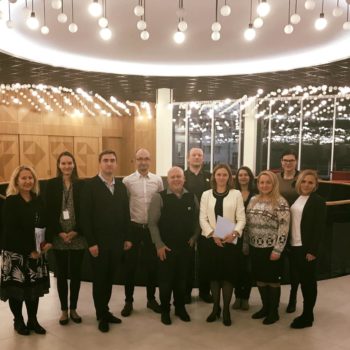Within the framework of the meeting, the Consortium leaders presented the National Action Plan of the Estonian Communities for 2017-2020 (National Plan) − a strategic document developed in cooperation with representatives of all KAP of the country. It should be noted that the main purpose of the National Plan implementation is to expand access to the HIV care continuum for everyone who needs it in Estonia.
 During the discussions the Consortium members had an opportunity to present their achievements and the barriers they encountered in their work. Thus, the Estonian Network of PLWH presented the results of the study focused on access to treatment and psychosocial services. The meeting was dedicated to discussing the concept of a new HIV strategy.
During the discussions the Consortium members had an opportunity to present their achievements and the barriers they encountered in their work. Thus, the Estonian Network of PLWH presented the results of the study focused on access to treatment and psychosocial services. The meeting was dedicated to discussing the concept of a new HIV strategy.
Ms. Vice-Chancellor emphasized the importance of developing state cooperation with NGOs and the KAP communities to overcome the HIV/AIDS epidemic in Estonia, moreover, she expressed the state’s interest in establishing a communication platform with NGOs to discuss and resolve the challenges and issues associated with the HIV/AIDS epidemic.
The Estonian Consortium leaders, from their side, asked specific questions about the financing of communities through the governmental contracting mechanism, namely when the state contract is expected to become an accessible option for communities. Representatives of the community have highlighted the need for dialogue with politicians and decision-makers. Other discussed issues included the participation of municipalities in HIV and drug addiction response, as well as the possibility of holding a roundtable on the issues of MSM and health, de-medicalization and community-based testing, the issue of HIV criminalization, as well as the situation with harm reduction programs scale up.
Cases and outcomes of the joint programs of the Estonian consortium member organizations with the East Europe and Central Asia Union of People Living with HIV (ECUO PLWH) and the Eurasian Coalition on Male Health (ECOM) were presented.
The Estonian Consortium of Communities was established at the turning point of the PLWH community activities. When international financial support started shrinking, the activists faced the task of building a “new start” in the history of NGOs. At that time an urgent need emerged for new mechanisms and cutting-edge approaches to solving community problems and cooperation.
“And such brand new mechanisms in Estonia were soon shaped into a new format – the so-called Consortium Trio: Estonian Network of PLWH, VEKLGBT, LUNEST”, says Lachin Aliyev, Director of the Estonian Network of PLWH. “The Consortium emerged from the negotiation process of community organizations focusing on “cross-cutting” issues related to HIV, but it is the right of people to be themselves which laid the foundation of our work!”
One of the Consortium success indicators is that the community organizations are consistently developing on their own and to date have become recognizable in the country and the region.
“It is the soft, “intelligent” force, a weighted and staged approach to the implementation of the goals, which make the Consortium mode of operation so attractive”, says Lachin Aliyev. These distinctive features, in the opinion of the participants, make the Consortium a powerful pivot point for all other organizations and individuals seeking an equitable and mutually beneficial dialogue.
Partner NGOs are also interested in the Consortium as observers and potential “recruits”. At the same time, the Consortium today is approaching the milestone, when it will be necessary to set up the development priorities, and official registration will become the next step of its progress after Strategic Planning and appointment of representatives on all levels.
